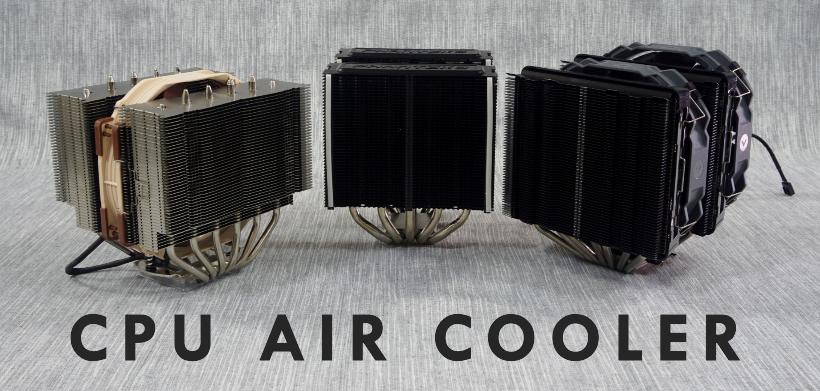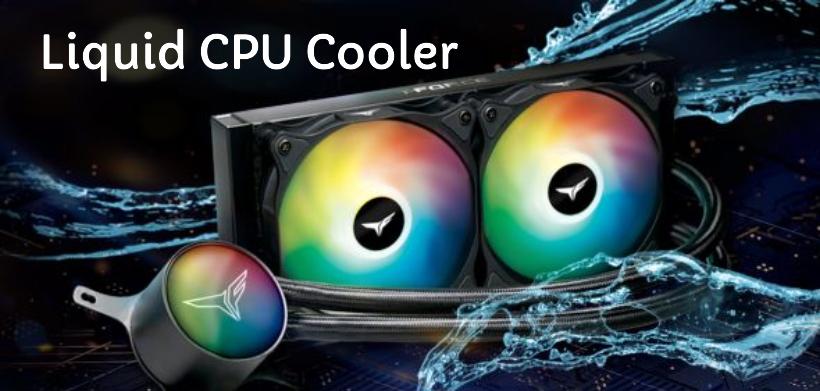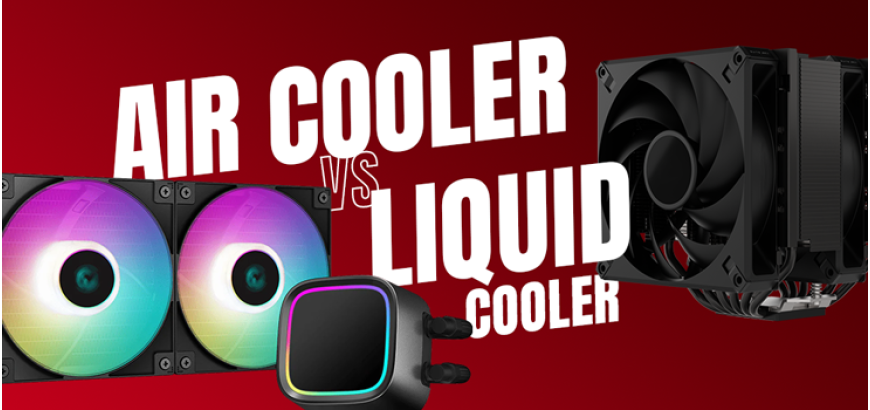When it comes to building a desktop PC, cooling is a critical consideration. Choosing the perfect CPU cooler ensures that your components run efficiently and have a longer lifespan. Among the numerous choices, air coolers and liquid CPU coolers are the two main types. Each type offers unique advantages, making the decision between them a matter of understanding your specific needs and preferences. In this blog, we will dive into the details of both types of CPU coolers, helping you determine which is best for your build.
CPU Air Cooler
Air coolers are a popular and cost-effective choice for managing PC temperatures. These CPU coolers operate using a combination of heat sinks and fans to dissipate heat away from the CPU or GPU. The heat sink, typically made from aluminum or copper, absorbs heat from the processor and transfers it to its fins, increasing the surface area available for cooling. Attached fans then blow air over these fins, moving the heat away from the components and out of the computer case. These CPU coolers are straightforward and efficient for most standard and mid-range builds. CPU air coolers are also easy to install, requiring minimal effort and time, making them an accessible option for both beginners and experienced builders. Their reliability and low maintenance needs are key advantages, with the primary upkeep being occasional dust removal from the fans and heat sinks.

Liquid CPU Cooler
Liquid CPU coolers offer superior cooling performance, making them an excellent choice for high-performance and overclocked systems. They function by circulating a liquid coolant through a water block attached to the CPU or GPU, absorbing heat directly from the component. The heated coolant is then pumped through tubes to a radiator, where fans dissipate the heat from the coolant before it is recirculated back to the water block. These CPU coolers are more efficient than air coolers, allowing liquid coolers to handle higher thermal loads with ease. Also, liquid CPU coolers typically produce less noise since their fans can operate at lower speeds due to the improved efficiency of liquid cooling. Aesthetically, liquid cooling systems can enhance the visual appeal of a build, offering sleek designs and customizable RGB lighting that can match the overall theme of the setup.

Differences Between Liquid Coolers and CPU Coolers
When deciding between liquid cooling and air cooling for your PC build, understanding the fundamental differences of both CPU coolers is crucial. Below are the key differences between liquid CPU coolers and CPU air coolers:
Performance
CPU air coolers rely on fans and heat sinks to dissipate heat from the CPU and GPU. The process involves heat being absorbed by the heat sink, which is then blown away by the fans. These CPU coolers are effective for standard and mid-range builds, where the thermal output is manageable. However, air cooling might struggle with high-performance or overclocked systems because the efficiency of air as a cooling medium is limited by the surface area of the heat sink and the airflow generated by the fans.
On the other hand, liquid CPU coolers use liquid coolant to transfer heat away from components. The coolant circulates through a water block attached to the CPU or GPU, absorbs the heat, and then moves through tubes to a radiator. The radiator, cooled by fans, dissipates the heat out of the case. These CPU coolers are significantly more efficient at heat dissipation, making it ideal for high-performance and overclocked systems. Liquid CPU coolers can handle higher thermal loads due to the superior heat transfer properties of liquids compared to air.
Noise Levels
Noise levels are another crucial factor to consider when choosing CPU coolers. Air coolers can be noisy, especially under heavy load when the fans need to spin faster to dissipate more heat. The noise can be managed to some extent with high-quality fans and proper case ventilation, but generally, air cooling is louder than liquid cooling.
Liquid CPU coolers, on the other hand, tend to be quieter. The reason is that liquid cooling is more efficient, allowing it to maintain lower fan speeds even under heavy load. The pump that circulates the coolant does produce some noise, but this is often minimal compared to the noise from air cooler fans. The fans on the radiator of a liquid cooling system can be larger and operate at slower speeds, further reducing noise levels.
Cost
Cost is a significant consideration for many builders. Air cooling solutions are typically less expensive, making them an attractive option for those on a budget. Even high-performance air coolers are generally more affordable than entry-level liquid cooling systems. This cost-effectiveness makes CPU air coolers a sensible choice for standard builds and users who do not require extreme cooling performance.
Liquid cooling, however, comes at a higher cost. The price of liquid CPU coolers varies significantly based on their complexity and features. Custom loop systems, which offer the best cooling performance and aesthetics, can be particularly expensive. While the higher upfront cost of liquid CPU coolers may be justified for high-end builds that need superior cooling, it can be a considerable investment for budget-conscious users.
Installation
When it comes to installation, air cooling is simpler and quicker. Installing an air cooler typically involves attaching the heat sink to the CPU with a few screws and connecting the fan to the motherboard. This straightforward process makes air cooling an attractive option for beginners or those who prefer a hassle-free setup.
Liquid CPU coolers are more complex to install. The installation process involves mounting the water block to the CPU or GPU, securing the radiator, and routing the tubes properly. This requires careful planning to ensure the radiator fits within the case and the tubes do not interfere with other components. While the installation is more time-consuming, it often results in a cleaner and more organized build, as the water block and tubes can free up space around the CPU socket.
Maintenance
Maintenance is another area where air cooling has the edge. These CPU coolers are generally maintenance-free, requiring only occasional cleaning to remove dust from the fans and heat sinks. This makes air cooling a reliable, low-maintenance solution for most users.
Liquid CPU coolers may require periodic maintenance. This can include checking for leaks, refilling the coolant, and potentially replacing parts over time. The risk of leaks, though rare, is a concern as it can damage components if not addressed promptly. Users opting for liquid cooling need to be prepared for this additional upkeep to ensure the system continues to operate effectively.
Reliability
In terms of reliability, CPU air coolers are often seen as more dependable. With fewer moving parts and no risk of leaks, air coolers provide consistent performance over the long term. This makes them a reliable choice for users who prefer a set-it-and-forget-it approach.
Liquid cooling, while offering superior performance, comes with more risk factors. These CPU coolers relies on the integrity of the pump and coolant, and any failure in these components can lead to issues. However, with proper maintenance and high-quality components, liquid cooling systems can also be highly reliable.
Aesthetics and Space
Aesthetics and space considerations also play a role in the decision. Air coolers can be bulky, with large heat sinks that may interfere with other components like RAM. While some air coolers come with LED lighting for visual appeal, they offer limited customization options compared to liquid cooling.
Liquid CPU coolers, especially custom loops, are generally more visually appealing. They offer sleek designs with transparent tubing and customizable RGB lighting. This makes them an excellent choice for builders who prioritize aesthetics and want a unique, eye-catching setup. Additionally, liquid cooling can be more space-efficient around the CPU socket, allowing for better overall case airflow and organization.
Making the Choice: Air vs. Liquid
Choosing between air and liquid cooling depends on your specific requirements, budget, and preferences. Here's a short summary to help you decide which CPU Cooler to choose:
Choose Air Cooling If:
- You are building a budget desktop PC.
- You prefer a straightforward, reliable cooling solution.
- Your build does not require extreme cooling performance.
- You want to avoid the hassle of maintenance and potential risks of leaks.
Choose Liquid Cooling If:
- You are building a high-performance or overclocked PC.
- You prioritize quiet operation.
- You want a sleek, aesthetically pleasing build with customization options.
- You are comfortable with a more complex installation process and occasional maintenance.
Both air and liquid CPU coolers have their merits and are suited to different types of PC builds. By understanding the advantages and limitations of each, you can make an informed decision that aligns with your performance needs, budget, and personal preferences. For a more detailed PC building guide, check out the things to consider before buying a desktop PC. Whether you opt for the simplicity and reliability of air coolers or the superior performance and aesthetics of liquid CPU coolers, the key is to ensure that your system remains cool and efficient, enabling you to get the most out of your components.



Comments
There are no comments for this Article.